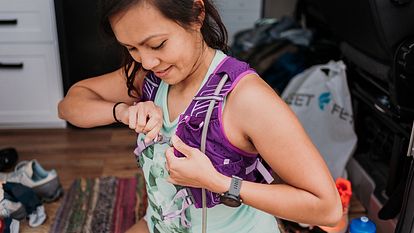6 Tips For Safely Running In Hot Weather

Running in the heat can put you at risk for dehydration, sunburn and even heat exhaustion. Before you enjoy miles in the sun, make sure you take the proper precautions so you can safely enjoy your run.
Stay Hydrated

As always, hydration is key, especially when running in hot weather. Stay hydrated by drinking water periodically throughout the day roughly every 30 minutes, or whenever your mouth feels dry. It is suggested that men drink about 15.5 cups of water/day, while women should drink about 11.5 cups of water/day.
Hydrating during your run is important too. As you sweat, your body loses water and electrolytes that are key to performance and recovery. Pack along a sports drink or hydration supplements for during or after your workout.
For runs longer than 90 minutes, make sure you wear a hydration pack or handheld water bottle to keep yourself well-hydrated during longer efforts.
You can find the best hydration packs here, along with our hydration guide.
Wear Loose Clothing
Wearing flowy, breathable clothing can make a huge difference when you’re trying to stay cool in high temperatures.
Look for synthetic fabrics (not cotton) that can effectively take up sweat and dry quickly to help you regulate your temperature. While cotton can absorb moisture, it has a slower drying time than most synthetic fabrics, which can leave you feeling sticky and soggy while you run.
Additionally, go for light colored clothes, as they reflect more heat. Dark colors absorb more heat and make you feel even hotter than you are.
If you’re looking for additional sun protection, opt for short sleeved shirts over tank tops, as they can help protect your shoulders and back from the sun’s harmful rays as you run.
Shop our guide to the best hot weather running clothes.
Plan Your Run Time Wisely

Depending on where you live, the hottest hours of the day may vary. As a general rule of thumb, avoid running between the hours of 10am and 4pm, as this is when the sun’s rays are the strongest and when humidity tends to climb.
If you don’t have flexibility in your schedule to avoid running during these hot hours, make sure you take proper precautions by packing along hydration, wearing sun protection, and allowing your body plenty of time to stretch and hydrate before and after.
Don't Push the Pace
Whether or not you are following a training plan, listening to your body is important, especially when running in hot temperatures. When the temperature climbs, your pace shouldn’t.
In general, your pace and fitness will take a hit while running in high temperatures. This is a natural response your body uses to protect itself from overheating and dehydrating. If you are planning to run in the heat, focus on your perceived effort rather than the pace or mileage. Allow yourself to take walking breaks and drink water as needed.
Bring Sun Protection

While hydration is an important part of preparing for a summer run, protecting your skin and eyes from the sun is also essential to safely running in the heat.
Wear a hat or visor while you run to keep the sun off your face and scalp. Bring along running sunglasses to protect your eyes as well. The best running sunglasses are often lightweight and feature no-slip gripping so they don’t bounce around or slip off your face as you run and sweat.
No matter what clothing (or lack thereof) you wear, or where you run, sunscreen is a must-have. Not only can wearing sunscreen protect your skin from sun damage and premature aging, it can reduce your risk of skin cancer over time.
You don’t need to wear a high SPF to feel the benefits either. According to the Skin Cancer Foundation, daily use of 15 SPF sunscreen is all you need for effective sun protection. Experts suggest reapplying every hour, or even more frequently if you are sweating or in and out of water. Look for sport sunscreen that carries extra waterproofing to outlast sweat during hot weather runs.
Know The Signs of Heat Exhaustion
Heat exhaustion can happen to anyone, even the most prepared runner. Many factors go into why heat exhaustion occurs, but the best way to get help is to know the signs and symptoms and to act quickly.
Here are the most common symptoms of heat exhaustion according to the CDC:
- Heavy sweating
- Cold, pale, clammy skin
- Fast, weak pulse
- Nausea or vomiting
- Fatigue, dizziness, fainting
If you or your running partner begin to experience any of these or worse symptoms, stop running, find a cool place to sit or lay down and cool off as best you can by loosening clothes or taking a cold bath.
The CDC suggests that if heat exhaustion continues for over an hour or worsens in any way, to call emergency medical services.



Join our Newsletter
Get deals, events, and more.
Connect with Fleet Feet
Get involved on social media.
Find a Location
Fleet Feet has over 250 locations nationwide!
Find a Store